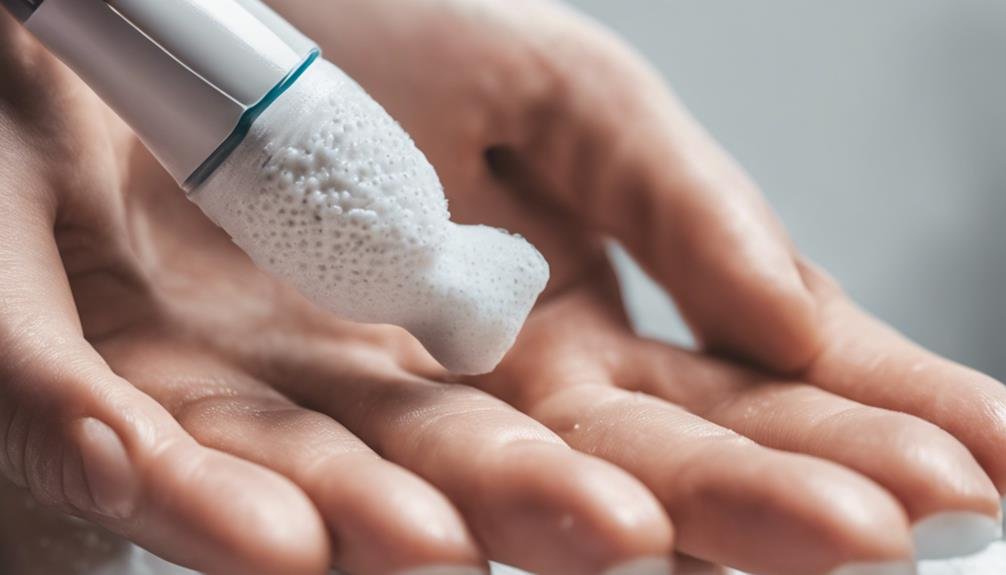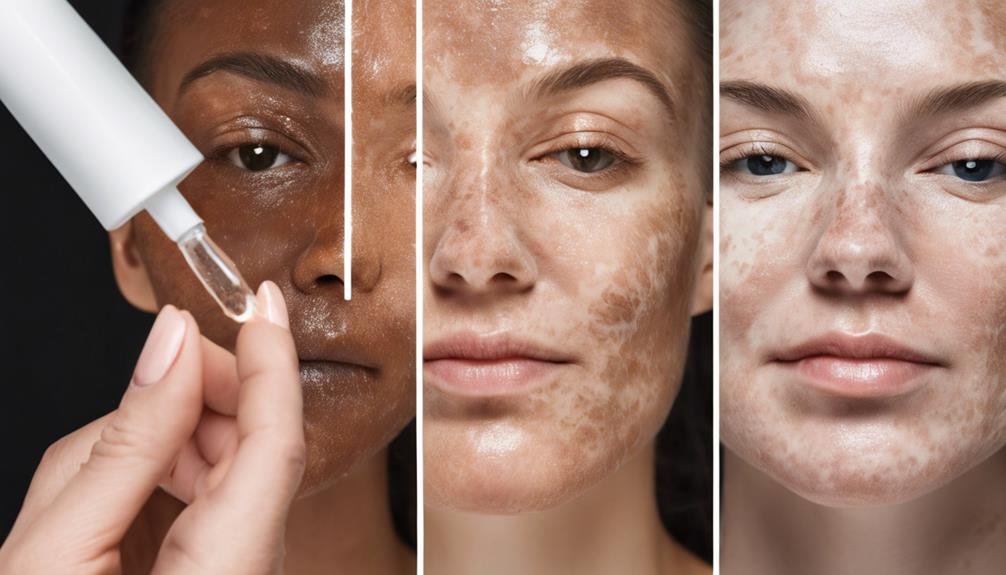If you've been struggling with dark spots on your skin, you're not alone. While there are numerous products and treatments available to address this concern, finding the right approach for your specific needs can be daunting. However, by understanding the causes of dark spots and implementing a targeted skincare routine, you can start on the path towards achieving a more even complexion. But what are the most effective treatments, and how can you ensure long-lasting results? Let's explore some key strategies to help you on your journey to clearer, brighter skin.
Key Takeaways
- Use topical treatments like hydroquinone or Vitamin C to inhibit melanin production.
- Consider professional treatments such as chemical peels or microdermabrasion for effective dark spot reduction.
- Prioritize sun protection with broad-spectrum sunscreen and protective clothing to prevent new dark spots.
- Maintain skin health with hydration, a healthy diet, and a consistent skincare routine to fade dark spots.
- Seek professional consultation for accurate assessment, personalized treatment plans, and prevention strategies for dark spots.
Understanding Dark Spots
To effectively address dark spots, it's crucial to first understand the underlying causes. Dark spots, also known as hyperpigmentation, are typically caused by an overproduction of melanin in certain areas of the skin. This excess melanin can be triggered by various factors such as sun exposure, hormonal changes, skin injuries, and inflammation.
Sun exposure, in particular, is a significant contributor to the development of dark spots, as UV radiation stimulates melanin production in an attempt to protect the skin from damage.
Hormonal changes, like those experienced during pregnancy or while taking certain medications, can also lead to the formation of dark spots. Skin injuries, such as acne or eczema, can cause inflammation and trigger melanin production, resulting in post-inflammatory hyperpigmentation.
Importance of Sun Protection
Prioritize safeguarding your skin against harmful UV rays by emphasizing the significance of sun protection. Sun exposure is one of the leading causes of dark spots on the skin. UV rays stimulate the production of melanin, leading to hyperpigmentation in the form of dark spots.
To prevent further darkening of existing spots and the development of new ones, it's crucial to protect your skin from the sun's harmful effects. Make sunscreen a non-negotiable part of your daily skincare routine. Choose a broad-spectrum sunscreen with an SPF of 30 or higher and remember to reapply every two hours, especially when outdoors.
Additionally, seek shade during peak sun hours, wear protective clothing like hats and sunglasses, and avoid tanning beds. By diligently practicing sun protection, you not only prevent dark spots but also reduce your risk of skin cancer and premature aging. Your skin will thank you for the care and attention you provide.
Topical Treatments
When addressing dark spots on your skin, exploring the effectiveness of topical treatments is essential. Topical treatments can target specific areas of hyperpigmentation and help even out your skin tone. Here are some common topical treatments you may consider:
| Treatment | Description | Key Benefits |
|---|---|---|
| Hydroquinone | A skin-lightening agent that inhibits melanin production. | Effective for reducing dark spots. |
| Vitamin C | An antioxidant that can brighten skin and reduce pigmentation. | Helps fade dark spots over time. |
| Retinoids | Derived from Vitamin A, they promote skin cell turnover. | Improves overall skin tone. |
| Kojic Acid | Inhibits melanin production and brightens the skin. | Effective for treating hyperpigmentation. |
| Alpha Arbutin | Blocks melanin production and helps fade dark spots. | Gentle on the skin with visible results. |
These topical treatments can be beneficial in addressing dark spots, but it's essential to consult with a dermatologist to determine the most suitable option for your skin type and condition.
Chemical Peels
Considered an effective method for improving skin texture and addressing hyperpigmentation, chemical peels are a popular treatment option in dermatology. These peels involve the application of a chemical solution to the skin, which causes it to exfoliate and eventually peel off, revealing smoother, more even-toned skin underneath. Here are some key points to consider about chemical peels:
- Types: Chemical peels can be categorized into superficial, medium, and deep peels, with varying degrees of intensity and downtime.
- Benefits: They can help reduce the appearance of dark spots, acne scars, fine lines, and wrinkles, leading to a more youthful complexion.
- Considerations: It's important to consult with a dermatologist to determine the most suitable type of chemical peel for your skin concerns and to ensure proper aftercare to optimize results.
Chemical peels can be a valuable addition to your skincare routine, offering noticeable improvements in skin tone and texture when done correctly.
Microdermabrasion Benefits
For those seeking a non-invasive exfoliation treatment to improve skin texture and appearance, microdermabrasion offers a gentle yet effective solution. This procedure involves using a handheld device to gently exfoliate the top layer of skin, removing dead cells and revealing a smoother, more radiant complexion. Microdermabrasion is known for its ability to reduce the appearance of dark spots, fine lines, and acne scars, making it a popular choice for individuals looking to rejuvenate their skin without the need for downtime.
One of the key benefits of microdermabrasion is its ability to stimulate collagen production, which can help improve skin elasticity and firmness over time. Additionally, this treatment can enhance the effectiveness of skincare products by allowing them to penetrate more deeply into the skin.
Many people also find that microdermabrasion results in a more even skin tone and a brighter complexion.
Laser Therapy Options
To address skin concerns such as dark spots, laser therapy options provide advanced solutions that target specific pigmentation issues with precision. Laser therapy is a popular choice for those seeking effective treatment for dark spots. Here are some key points to consider:
- Types of Lasers: Different types of lasers can target various pigmentation concerns. For dark spots, lasers such as Q-switched Nd:YAG or picosecond lasers are commonly used for their ability to break down excess melanin in the skin.
- Number of Sessions: The number of laser sessions needed varies depending on the severity of the dark spots and the type of laser used. Typically, multiple sessions spaced a few weeks apart are recommended for optimal results.
- Potential Side Effects: While laser therapy is generally safe, there can be some side effects such as temporary redness, swelling, or changes in skin pigmentation. It's essential to discuss these risks with your dermatologist before undergoing treatment.
Natural Remedies to Try
When looking for alternative approaches to addressing dark spots, exploring natural remedies can provide a gentle yet effective way to improve skin pigmentation. Natural remedies are often favored for their gentle nature and minimal side effects. Here are some common natural remedies you can try at home:
| Remedies | Description |
|---|---|
| Lemon Juice | Contains citric acid, which may help lighten dark spots when applied topically. |
| Aloe Vera | Known for its soothing properties, it may help reduce inflammation and promote skin healing. |
| Green Tea | Rich in antioxidants, green tea can help protect the skin and reduce the appearance of dark spots. |
| Turmeric Paste | Turmeric has anti-inflammatory properties and may help even out skin tone when used regularly. |
| Apple Cider Vinegar | Contains acetic acid, which may help exfoliate the skin and lighten dark spots over time. |
These natural remedies can be a good starting point in your journey to address dark spots, but it's essential to consult with a dermatologist for personalized advice and to ensure these remedies are suitable for your skin type.
Diet and Lifestyle Changes
Considering the impact of diet and lifestyle on skin health is essential when addressing dark spots. Making simple changes can greatly improve the overall appearance of your skin and help fade those stubborn spots. Here are some key diet and lifestyle adjustments to consider:
- Hydration: Keeping your body well-hydrated is crucial for skin health. Drinking an adequate amount of water each day helps flush out toxins and promotes skin cell regeneration.
- Healthy Diet: Incorporating foods rich in antioxidants, vitamins, and minerals can benefit your skin. Fruits, vegetables, whole grains, and lean proteins can provide essential nutrients that support skin repair and regeneration.
- Sun Protection: Protecting your skin from UV damage is vital in preventing the formation of dark spots. Always use sunscreen with a high SPF, wear protective clothing, and seek shade during peak sun hours to maintain skin health and prevent further darkening of spots.
Skincare Routine Tips
Ensuring a consistent and effective skincare routine is paramount in addressing dark spots and maintaining overall skin health. To tackle dark spots, start by cleansing your face twice daily with a gentle cleanser suitable for your skin type.
Exfoliate regularly to remove dead skin cells that can contribute to the appearance of dark spots. Incorporate a vitamin C serum into your routine, as it can help brighten the skin and fade dark spots over time.
Additionally, using a daily moisturizer with SPF is crucial to protect your skin from further sun damage, which can worsen dark spots. Consider adding products with ingredients like niacinamide or retinol to your routine, as they can also help in reducing dark spots and promoting skin renewal.
Professional Consultation Benefits
To maximize the effectiveness of your skincare routine and address dark spots with precision, consider the invaluable benefits of seeking professional consultation. Consulting with a skincare professional can provide you with personalized recommendations tailored to your skin type and specific dark spots concerns.
Here are three key benefits of seeking professional help:
- Accurate Assessment: Skincare professionals have the expertise to accurately assess your dark spots' severity, type, and underlying causes, allowing for a targeted treatment plan.
- Advanced Treatments: Professionals can offer access to advanced treatment options, such as laser therapy, chemical peels, or prescription-strength topical creams, that may not be available over-the-counter.
- Prevention Strategies: Beyond treating existing dark spots, skincare experts can provide valuable insights into preventing future spots, offering guidance on sun protection, skincare products, and lifestyle adjustments to maintain healthy, spot-free skin.
Tips for Preventing Future Spots
For maintaining a clear and even complexion, implementing preventive measures is key to safeguarding your skin against future dark spots. Sun protection is paramount in preventing dark spots, so make sure to apply a broad-spectrum sunscreen daily, even on cloudy days. UV exposure is a major contributor to hyperpigmentation, so wearing protective clothing and seeking shade when outdoors can further shield your skin.
Regularly exfoliating your skin can also help prevent the buildup of dead skin cells, which can lead to uneven pigmentation. Incorporating antioxidants into your skincare routine can combat free radicals that contribute to skin damage, helping to maintain a healthy complexion. Hydration is crucial for skin health, so drink plenty of water and use moisturizers to keep your skin supple.
Lastly, avoid picking at your skin, as it can cause inflammation and potentially lead to dark spots. By following these preventive tips, you can help keep your skin looking radiant and spot-free.
Patience and Consistency Key
Patience and consistency are crucial elements in achieving the desired results when it comes to skincare. When addressing dark spots, it's important to understand that improvement takes time and requires a dedicated routine. Here's what you need to keep in mind:
- Steady Application: Consistently applying targeted treatments or serums can gradually fade dark spots over time. Make it a part of your daily skincare regimen to see results.
- Allow for Healing: Dark spots are often a result of past damage, so be patient with your skin as it undergoes the process of renewal. Give treatments time to work effectively.
- Protective Measures: While treating existing dark spots, don't forget to protect your skin from further damage. Sunscreen is essential to prevent new spots from forming and to support the fading process of existing ones.
Frequently Asked Questions
Can Hormonal Changes Cause Dark Spots?
Hormonal changes can indeed cause dark spots on your skin. These changes trigger melanin production, leading to hyperpigmentation. Consulting a dermatologist for proper diagnosis and treatment can help address the underlying hormonal imbalance and reduce dark spots.
Are Dark Spots Different From Freckles?
Yes, dark spots and freckles differ. Dark spots, also known as hyperpigmentation, result from excess melanin production, often due to sun exposure or hormonal changes. Freckles are small, light brown spots caused by genetics and sun exposure.
Can Stress Contribute to Dark Spot Formation?
Yes, stress can contribute to dark spot formation. When stressed, your body releases cortisol, which can increase melanin production. This excess melanin can lead to hyperpigmentation and the development of dark spots on your skin.
Is There a Link Between Dark Spots and Vitamin Deficiency?
Yes, a link exists between dark spots and vitamin deficiency. Lack of specific vitamins can contribute to pigmentation issues. Consult a healthcare provider for proper diagnosis and treatment. Addressing nutritional gaps may help improve skin health.
Can Dark Spots Be a Sign of an Underlying Health Issue?
Dark spots can sometimes signal underlying health issues. They may be linked to hormonal changes, liver problems, or vitamin deficiencies. Consult a healthcare provider for a proper diagnosis and treatment plan tailored to your needs.
Conclusion
In conclusion, removing dark spots requires patience and consistency with a combination of topical treatments, professional interventions, and a diligent skincare routine. While results may not be immediate, sticking to a personalized plan and being committed to sun protection will lead to visible improvements over time. Remember, everyone's skin is unique, so it's important to consult with a skincare professional to find the best approach for your specific needs and concerns.







